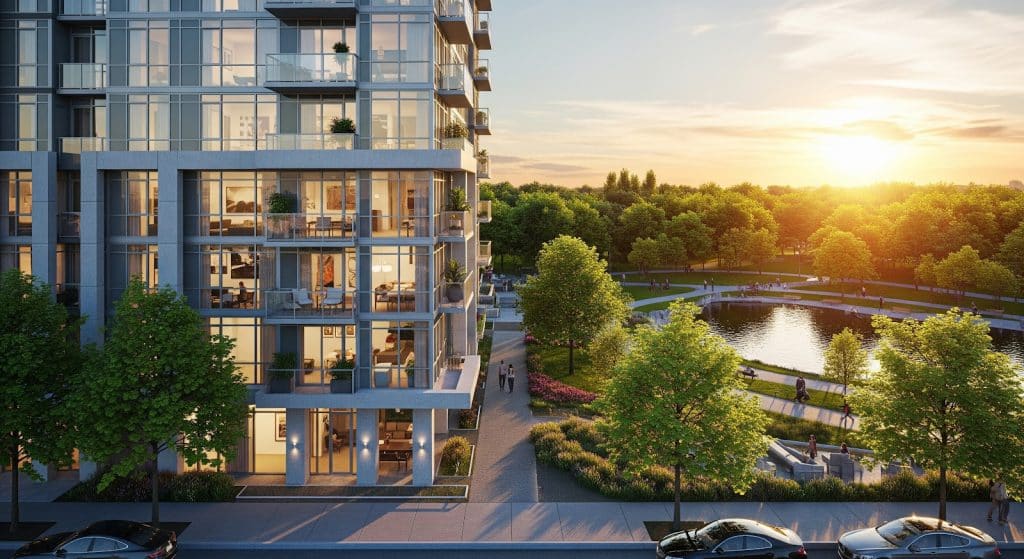Understand the full cost of ownership — beyond the list price — before making a first-time buyer decision
For young professionals entering Toronto’s housing market, condos often feel like the most accessible path to ownership. Smaller spaces, lower price points, prime locations — all appear to line up as a smart compromise between lifestyle and investment. But as many first-time buyers are discovering, the sticker price tells only part of the story.
In today’s market, the total cost of owning a Toronto condo can quickly outpace initial expectations. Between rising condo fees, property taxes, financing costs, and maintenance responsibilities, the math behind ownership has shifted. Before signing a deal, buyers need a deeper understanding of how much they’re truly committing to — and whether now is the right time to make that leap.
Mortgage Rates Aren’t the Only Factor Stretching Budgets
It’s no secret that borrowing has become more expensive. Interest rates in 2025 remain elevated, which impacts monthly mortgage payments significantly. But what often surprises new buyers is how much non-mortgage expenses influence their monthly carrying costs.
Most downtown Toronto Condos come with monthly maintenance or “common element” fees. These can range from $0.60 to over $1.00 per square foot, depending on the age and amenities of the building. A modest 650 sq. ft. unit could easily carry $500–$650 in monthly fees — before mortgage or taxes are even factored in.
Add rising property taxes, insurance premiums, and utility bills, and ownership often becomes more expensive than renting. Buyers with tight monthly budgets should model different scenarios to assess long-term affordability, especially in buildings with aging infrastructure or upcoming special assessments.
Appreciation Is No Longer a Guaranteed Outcome
For years, condo buyers in Toronto could assume rising values would offset short-term financial stretches. That assumption no longer holds.
Recent data from Maclean’s shows Toronto condo values have dropped by as much as 13% to 16% from their 2022 peak. Meanwhile, new condo sales in the GTA fell over 90% below the 10-year average as of Q2 2025, according to The Logic.
In a softer market, the value proposition of buying becomes more nuanced. A condo purchased today may not appreciate in the short term. In fact, some units may decline in value if bought at peak pricing — particularly in oversupplied or less transit-accessible areas.
That doesn’t mean buyers should avoid the market entirely, but it does mean that owning a condo for 2–3 years before selling may not provide the financial upside it once did. Long-term holding, strategic location selection, and real value analysis are more important than ever.
Resale and Rental Flexibility Is Slower Than Expected
Liquidity is another often-overlooked variable in the ownership equation. If a first-time buyer needs to relocate, upgrade, or sell within a few years, they may find the resale market slower than expected.
Condos, especially those in high-density areas, are facing stiffer competition and slower absorption rates. Many developers are still releasing inventory, and new listings continue to rise. If the unit is one of many similar floorplans or lacks distinguishing features (balcony, parking, views), buyers may be forced to accept lower offers or wait longer to sell.
Renting out a condo is not always a viable short-term solution either. Rental regulations, building rules, and weak rental growth can limit cash flow. Some buildings even restrict short-term rentals entirely, narrowing income strategies for temporary owners.
New Builds Come with Their Own Set of Risks
Many first-time buyers are drawn to pre-construction opportunities, hoping to lock in a unit now and complete the purchase later. But the recent wave of project delays and cancellations in Toronto’s condo sector has introduced serious risks into that equation.
According to CMHC, some buyers who signed pre-construction contracts in the past two years are facing unexpected valuation shortfalls or delivery delays, as developers struggle with financing or shifting costs.
When units appraise below the purchase price at closing, buyers must cover the difference out of pocket. If developers cancel the project, buyers may receive deposits back — but miss out on valuable time, planning opportunities, and market movement.
For first-time buyers considering new developments, legal review, developer reputation, and contract flexibility are non-negotiable due diligence steps.
Additional Resources
To explore alternative locations with more pricing flexibility, better amenities, or stronger future resale value, view available Condos for Sale North York curated for first-time buyers seeking long-term value.
